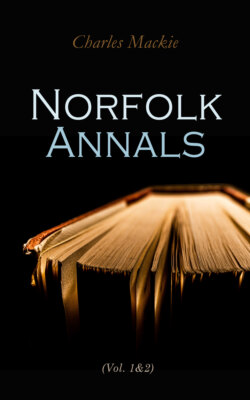Читать книгу Norfolk Annals (Vol. 1&2) - Charles Mackie - Страница 247
На сайте Литреса книга снята с продажи.
SEPTEMBER.
Оглавление2.—A cricket match between Holt and Bungay was played on Bungay Common. “The Bungay players, although allowed Fennex, had smuggled into their side two more professed Marylebone players.” Much wrangling took place on the 3rd, when Bungay refused to go on with the game, and the match was claimed by Holt. The return match was played at Holt on the 13th; Bungay had Fennex, Sparks, and Razell on their side. Scores: Holt, 120-73; Bungay, 73-104. “Mr. Pilch, of the Holt club, made 57.” The following notice was appended to the report of the match:—“The Holt club take this opportunity of publicly declaring their determination to decline any further contest or connection whatever with the Bungay club.”
11.—Mr. Young, who had previously appeared at Yarmouth, commenced an engagement at Norwich Theatre. His characters included Hamlet, Macbeth, Penruddock (“The Wheel of Fortune”), King Lear, and Zanga (“The Revenge”).
13.—The corner-stone of the new pump-room and baths at the Thetford chalybeate spring was laid with appropriate ceremony by the Duke of Grafton. His Grace and the Duchess drank of the water of the spring, dinner was served at the Guildhall, and a ball took place in the evening.
15.—A prize fight took place on Tasburgh Common, between Barlee, the Berghapton Groom, and Belasco. Between 8,000 and 10,000 persons were present. Hundreds of women attended, “some of very dashing and many more of respectable appearance to be spectatresses of bloody noses and cross buttocks.” Forty-one rounds were fought, and the contest ended in favour of Belasco.
16.—A public meeting was held at St. Andrew’s Hall, Norwich, “in order to take into consideration the late disastrous transactions at Manchester on August 16th. The Mayor presided, and resolutions were passed asserting the right of the subject to petition the King. The legality of the Manchester meeting was affirmed, the conduct of the magistrates and Yeomanry Cavalry censured, and a subscription was opened for the relief of the sufferers. An address was also proposed for presentation to the Prince Regent, in which his Royal Highness was asked to remove certain ministers from his presence and councils. The address was afterwards presented to the Prince at Carleton House by the members for the city. A counter declaration was also circulated in Norwich, and received 1,608 signatures. In due course it was presented to the Prince Regent.
20.—A meeting, presided over by the Mayor, was held at the Guildhall, Norwich, to take into consideration the best means to be adopted to carry into effect a plan for making a new street, and for erecting a bridge over the river Wensum at Duke’s Palace. The meeting was adjourned till October 18th, when a resolution in favour of the plan was rejected by a considerable majority. A meeting of the supporters of the undertaking was held on November 29th, under the presidency of Mr. George Morse, when it was reported that £7,000 of the £9,000 proposed to be raised by shares of £25 each had been subscribed. A Bill was afterwards introduced into Parliament, and was read a second time on December 17th. On February 26th it was announced that the Bill had not been passed in Committee of the House of Commons owing to the interference of the petitioners, and that the promoters would have to commence fresh proceedings in the new Parliament. On July 8th, 1820, it was stated that the Bill had passed both Houses. The foundation-stone of the bridge was laid on August 28th, 1821, by Mr. Alderman T. S. Day.
24.—The Mayor and Corporation of Yarmouth voted a loyal address to the Prince Regent, expressive of their “detestation of the wicked and atrocious attempts of seditious and disaffected subjects in various parts of the kingdom, now openly and avowedly meditating the subversion of the laws and Government, the annihilation at once of all distinctions of rank, and the sacred rights of property.”
